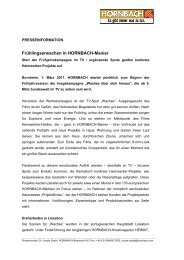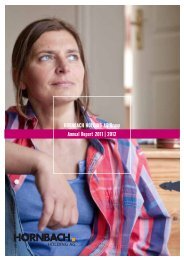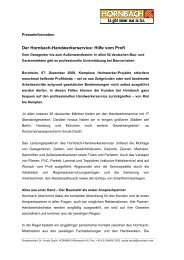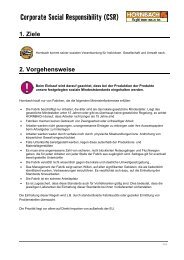Hornbach-Baumarkt-AG Group
PDF, 3,6 MB - Hornbach Holding AG
PDF, 3,6 MB - Hornbach Holding AG
- No tags were found...
You also want an ePaper? Increase the reach of your titles
YUMPU automatically turns print PDFs into web optimized ePapers that Google loves.
10 TO OUR SHAREHOLDERS<br />
TO OUR SHAREHOLDERS<br />
Dear Shareholders,<br />
We can look back on a demanding 2012/2013 financial year.<br />
Faced by numerous challenges that we as a company were<br />
unable to influence, we nevertheless generated earnings with<br />
which we can be satisfied. The crucial point here is that we<br />
continued to channel substantial resources and our innovative<br />
strength, and that without making any cutbacks, into our<br />
sustainable, long-term growth. Viewed from this perspective,<br />
2012/2013 was an important stepping stone on the way to the<br />
<strong>Group</strong>’s future development. Given the difficult underlying<br />
conditions, it is no surprise that our key sales and earnings<br />
figures ultimately failed to match the high standard set in the<br />
2011/2012 financial year.<br />
In 2010/2011 and 2011/2012, we boosted our consolidated<br />
sales by just under six percent each year. We originally targeted<br />
a similar rate of growth for the past 2012/2013 financial year<br />
as well. In the end, however, we only managed to post slight<br />
sales growth of 0.6% to € 3,020 million. More than anything,<br />
this noticeably lower level of sales momentum in the year<br />
under report was due to the acceleration in the economic<br />
downturn in the European Union.<br />
Europeans may have become more or less accustomed to the<br />
euro debt crisis as an ongoing state of affairs. However, the<br />
threat of state bankruptcy in Greece and widespread doubts<br />
as to politicians’ ability to implement reforms engendered<br />
even greater uncertainty among consumers, businesses, and<br />
investors across large parts of Europe from summer 2012<br />
onwards. Consequently, the European Union fell even more<br />
deeply into recession towards the end of 2012. In many countries,<br />
this noticeably reduced people’s willingness to consume<br />
and invest. It also did not fail to leave its mark on the retail<br />
sector, and on the DIY sector in particular.<br />
We too felt the strong economic headwind in the eight countries<br />
outside Germany in which we operate, and that with very<br />
few exceptions. Consumers were far more nervous in the<br />
second half of the financial year than was the case in Germany.<br />
To be on the safe side, private households in numerous<br />
European countries put back their construction or renovation<br />
projects. This situation was made worse by further negative<br />
factors, such as the real estate crisis in the Netherlands, or by<br />
Swiss residents going on cross-border shopping sprees. All in<br />
all, these factors placed an ever greater damper on demand at<br />
our DIY megastores with garden centers outside Germany the<br />
further the financial year progressed. It became apparent in the<br />
third quarter of 2012/2013 that it would no longer be possible<br />
to make up for the shortfall in like-for-like sales to the extent<br />
necessary to meet the previous sales forecast for the HORN-<br />
BACH-<strong>Baumarkt</strong>-<strong>AG</strong> <strong>Group</strong>. We therefore revised our forecast<br />
downwards in November 2012. We then achieved our target of<br />
matching the previous year’s level of consolidated sales.<br />
Pleasingly robust sales performance in Germany<br />
The 2012/2013 financial year showed once more why it is so<br />
important that we have a strong presence in the German DIY<br />
market. In the past, or to be more precise, prior to the financial<br />
and economic crisis in 2009, we repeatedly faced critical<br />
questions as to why we did not focus our expansion exclusively<br />
on countries outside Germany, not even to mention the<br />
hype about growth opportunities in Eastern Europe. Had we<br />
acted on all these supposedly great ideas, then we would have<br />
steered a far less successful course through the stormy waters<br />
of the sovereign debt crisis in the past two years. Among<br />
economists, Germany is viewed as a something of a safe<br />
haven. Numerous other European Union countries face economic<br />
problems, while rising unemployment is adversely<br />
affecting consumer demand. In Europe’s largest economy, by<br />
contrast, growth rates, the labor markets and consumer<br />
confidence were most recently in comparatively robust state.<br />
Against this backdrop, DIY customers in our home market<br />
seemed more interested in implementing their DIY and renovation<br />
projects than allowing themselves to be excessively<br />
distracted by concerns about the euro. This enabled us to<br />
maintain our like-for-like sales in Germany at the previous<br />
year’s level. That in itself is already a respectable achievement.<br />
After all, the 5.8% growth achieved in the 2011/2012<br />
financial year meant that the standard to beat in terms of our<br />
like-for-like sales performance in Germany was higher than at











